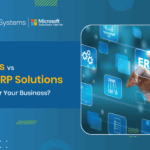
In today’s hyperconnected manufacturing and distribution landscape, supply chains have evolved from static operational backbones into dynamic, intelligence-driven ecosystems. Businesses are no longer just moving products; they are orchestrating global networks of suppliers, logistics partners, and production centers that need to operate in real time, under mounting cost and performance pressures.
To survive and thrive in this complex environment, organizations are turning to platforms that go beyond traditional ERP functionality. Microsoft Dynamics 365 Supply Chain Management is one such solution. It is engineered to provide end-to-end visibility, automation, and agility across your operations. But what exactly does the licensing for this powerful solution include? What functional depth and enterprise capabilities can you expect?
In this blog, we decode the full scope of the Microsoft Dynamics 365 Supply Chain Management license to help you understand its true value and how it supports resilient, future-ready supply chain operations.
A Closer Look at How Microsoft Licenses Dynamics 365 Supply Chain Management
When it comes to licensing Dynamics 365 Supply Chain Management, Microsoft takes a practical and role-based approach. Instead of forcing businesses into a one-size-fits-all model, it offers flexible options based on how users interact with the system.
Here’s how it works:
Full User (Base License)
This license is ideal for professionals who manage end-to-end supply chain activities. It gives access to the full suite of tools, including planning, procurement, production, and inventory management. It’s typically used by operations managers, planners, and warehouse leads who are hands-on with daily supply chain execution.
Add-On User (Attach License)
If your organization already uses another Dynamics 365 app, like Finance or Sales, you can add Supply Chain Management as an extension. This option is more cost-effective and makes sense for users who need to connect supply chain activities to other business areas without purchasing a separate full license.
This kind of licensing model gives businesses the freedom to scale their technology stack based on real needs. Whether you’re a large manufacturer running global operations or a mid-sized distributor streamlining logistics, you’re only paying for what your team actually uses, and getting seamless integration across the Microsoft ecosystem.
5 Core Capabilities Included in the D365 Supply Chain License
A D365 Supply Chain license unlocks a robust set of features built to streamline and optimize supply chain operations. Here’s what organizations gain access to:
1. Inventory and Warehouse Management
Efficient inventory control is at the heart of any supply chain. Dynamics 365 SCM offers:
- Real-time inventory tracking
- Barcode scanning and RFID capabilities
- Rules-based replenishment
- Advanced warehouse management with location-based routing and wave picking
These features allow enterprises to manage multi-site warehouses and avoid costly stockouts or overstocking.
2. Production and Manufacturing Execution
The Dynamics 365 SCM license includes capabilities to manage discrete, lean, and process manufacturing. Users can:
- Track production orders and operations
- Schedule resources with finite capacity planning
- Integrate shop floor data via IoT sensors
- Manage BOMs and product variants
These tools ensure agile production planning and cost-efficient execution.
3. Procurement and Sourcing
Procurement is simplified with features that support:
- Vendor collaboration portals
- Purchase requisitions and approvals
- RFQ (Request for Quotation) automation
- Vendor performance tracking
Through smart procurement, businesses reduce supplier risks and enhance vendor transparency.
4. Asset Management
Included in the Microsoft Dynamics 365 Supply Chain Management license is an integrated asset management solution. This includes:
- Preventive and predictive maintenance schedules
- Asset lifecycle tracking
- Work order management
- Spare parts inventory integration
This improves asset uptime and extends equipment life across plants and warehouses.
5. Demand Forecasting and Supply Planning
Demand-driven planning tools embedded in Dynamics 365 SCM help businesses stay ahead of market shifts. Features include:
- Machine learning-based forecasting
- Multi-echelon inventory planning
- What-if analysis
- Priority-based allocation
These planning tools align production with real-time demand and reduce inventory carrying costs.
Advanced Capabilities for Connected Logistics
Microsoft Dynamics’ supply chain management licensing also includes advanced features designed for global logistics and transportation. Organizations can benefit from:
- Route planning and carrier management
- Freight reconciliation
- Transportation planning
- Dock appointment scheduling
Such capabilities ensure your business meets delivery promises while controlling freight costs.
Built-In Integration with Other Microsoft Products
One of the most significant value drivers of the D365 Supply Chain license is its native integration with Microsoft’s ecosystem. The permit enables seamless interoperability with:
- Dynamics 365 Finance for unified financial and operational insights
- Dynamics 365 Sales for real-time demand visibility
- Power BI for data visualization and reporting
- Microsoft Teams and Excel for real-time collaboration
With these integrations, your supply chain becomes not only connected but intelligent.
Compliance and Security
Microsoft’s licensing also covers enterprise-grade compliance and security capabilities. Companies benefit from:
- Role-based security
- Audit trails and approval workflows
- Compliance with GDPR, ISO, and other global standards
This helps enterprises avoid legal pitfalls while strengthening internal governance.
Who Needs a D365 Supply Chain License?
Typically, businesses in manufacturing, distribution, retail, and logistics industries benefit most. The license is ideal for users in roles such as:
- Supply chain planners
- Operations managers
- Warehouse supervisors
- Procurement specialists
- Maintenance technicians
By aligning licenses with functional roles, businesses can maximize both compliance and productivity.
Final Thoughts: Investing in Operational Intelligence
The Dynamics 365 SCM license isn’t just a piece of software – it’s an investment in operational intelligence. It empowers organizations to:
- Drive agility across the value chain
- Enhance decision-making with data
- Improve customer service through responsive supply chain execution
With its comprehensive scope and deep integration, Microsoft Dynamics 365 Supply Chain Management offers a modern, cloud-based approach to solving age-old logistics and operational challenges.





